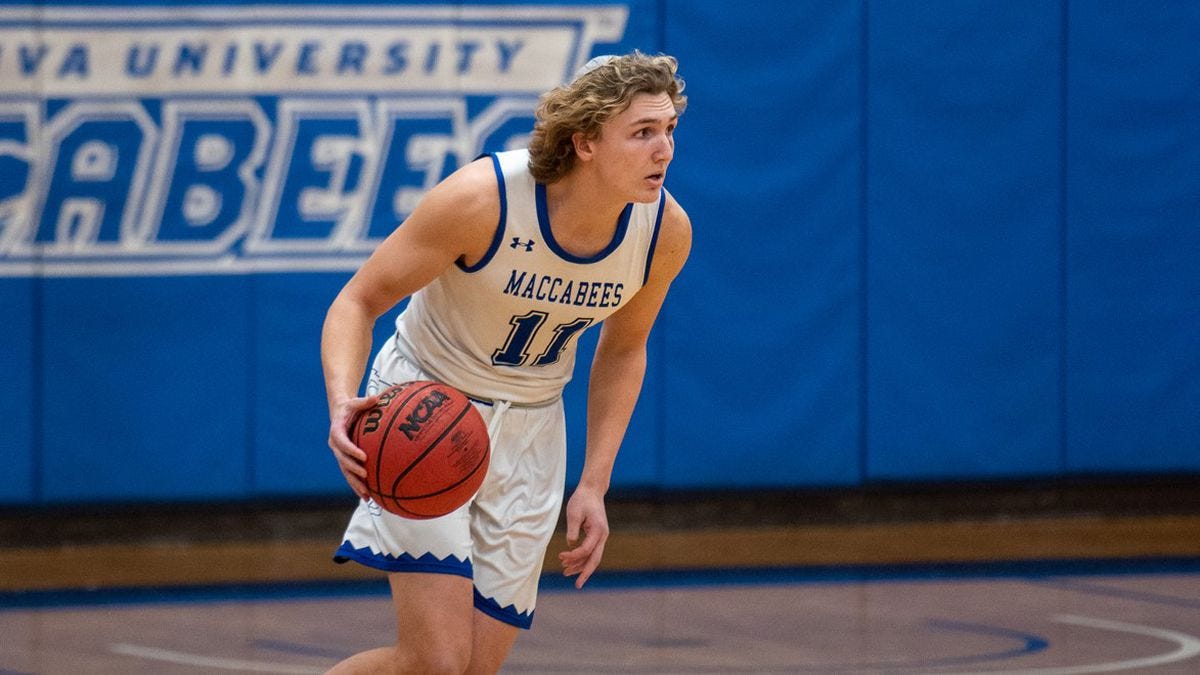Ryan Turell: 2022 NBA Draft Scouting Report
Can the Yeshiva sharpshooter make the jump from D3 to the NBA and become the league's first ever Orthodox Jewish player?
As a former Division III basketball coach, there’s a soft spot in my heart for the level. Better than so many give it credit for, D3 hoops relies on the dedication and passion of student-athletes at a non-scholarship level. It’s brutally hard: no luxury flights or glory, long winter breaks without fans in the stands, limited exposure, fewer resources than several high schools, no major accommodations for academics and a severe amount of limitations placed upon coaching staffs by the NCAA. Chief among those limitations: no direct access to players on-court in the offseason.
If a player is to get better and to develop year after year, they do so on their own terms. They make the improvements happen on willpower, desire to be in the gym and individual regimen. To see Ryan Turell turn into a legitimate pro prospect at the Division III level finally shines light on the best of the best that D3 has to offer — and those guys are good enough to play around the world.
The case of Turell is a tad different than most. He attended Yeshiva, an Orthodox Jewish institution in New York City, and became a sensation amongst their rabid fanbase. Over the last three seasons with Turell as the main attraction, the Maccabees have been one of the most successful programs in D3: they hold a 61-5 record and have qualified for the NCAA Tourney both years it’s been played.
So many fans, scouts or casuals unfamiliar with the level will write off the level of competition without a glimpse, seeing Turell’s numbers and production more a byproduct of their misunderstanding of D3 and not enough about his high skill level. That said, there are legitimate questions to be raised about how much of what Turell does will translate onto a court with greater athletes, and in a system where every offensive set isn’t catered around him.
What does Turell bring to the table? Elite catch-and-shoot impact. He’s as prolific of a jump shooter as we’ve seen across every level. Over his four-year career, Turell has made 183 triples, connecting on 45% of his attempts. Those numbers are that much more impressive when you consider the D3 season a year ago was limited to only seven games, with no NCAA Tournament.
Turell does everything for Yeshiva. He posts up, operates off screens, gets free in their movement-based sets, handles it in transition, scores in the mid-range and creates for others. Wherever his next stop is, it’s highly unlikely he gets any similar type of long leash. He’ll likely be typecast as a 3-point specialist, a sniper who is best when squared to the rim and rarely misses an open look.
The biggest differences between Division I and Division III aren’t necessarily skill-based, but size and athleticism. The best Division III teams, which can feature a little more size or a great player, are often as competitive as the low-to-mid major teams at the Division I level. Yeshiva tore through the Skyline Conference, a New York-based league with more regional players, not a ton of size relative to D3, and weaker numbers in terms of conference metrics. There isn’t a great comparison to a D1 league, but it’s worth noting that the Maccabees struggled more against elite competition such as Illinois Wesleyan and Johns Hopkins, two ranked powerhouse at the level.
Turell’s background is part of the reason he ended up at Yeshiva. An Orthodox Jew, Turell was a natural fit for the social and religious aspects of the private school in New York. He carries with him the support of one of college sports’ most devoted fan bases, and if you haven’t heard of them before, we strongly encourage you to read up. As an Orthodox Jew, Turell wears a yarmulke during competition, as do his teammates at Yeshiva. They are, as a team, unable to play after sundown on Friday and before sundown on Saturday. We’ve seen the NBA in the past not bend with scheduling games for religious purposes such as fasting during Ramadan. Availability may come into question, for right or for wrong, about those Friday night games, which are pretty much played on a weekly basis. By our count, an average NBA team plays 17 to 19 games on Friday nights, more than 20% of their schedule.
For a guy like Turell, reworking the improvement areas of his game will be vital in seeing how high of a level he can stick at.




